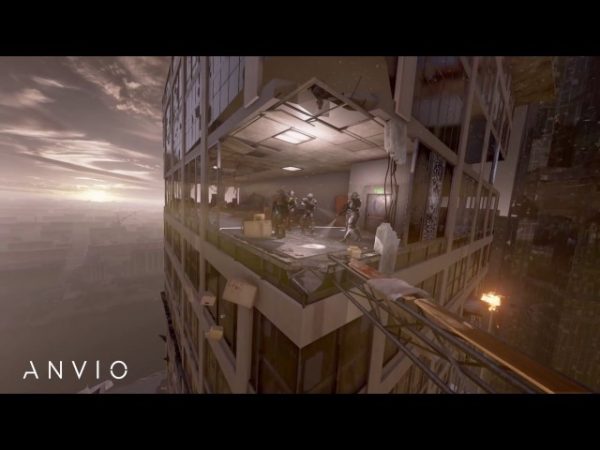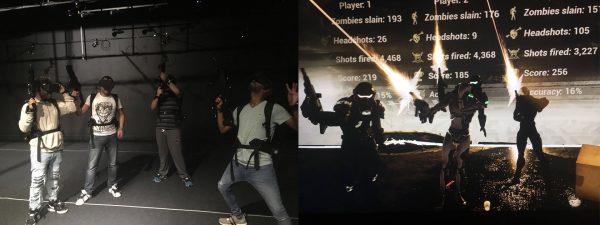The new craze in video gaming is VR (Virtual Reality). This is usually based on an electronic head piece that contains a stereoscopic visual monitor and headphones to make the player see and hear things in the virtual world. Until now, however, VR gaming control methods have remained disappointingly similar to their regular counterparts. Enter Anvio VR, which has the potential to change the game entirely.
This London-based company promises not only to utilise VR headsets, they also incorporate hand, foot and body motion sensors. This means no more worrying about memorising what buttons to press on the controller—your body is the controller. The sensors on your body project every movement into the virtual world, so that it feels much more like the real world. Me and my friends could hardly wait to try it out.

On arrival at Anvio we were greeted by a technician called Max. He asked us to come into the playing space and started explaining how the system worked. The edges of the room were bordered with white tape, which would be represented in the game as walls. Max informed us we would be playing City Z, a zombie game set in a post-apocalyptic Moscow. Then he showed us our new best friend, a toy assault rifle with motion sensors on it, which we would be using to complete our mission. After a quick calibration of the system, Max gave us the go ahead to put on our VR headsets and immerse ourselves in the virtual world.
The system is surprisingly accurate – and that’s an understatement. Every hand movement, every step, every karate kick or pose that I made could be seen in the game, followed by the laughter of my friends watching me.
As the game started and zombies started breaking through the lobby windows, I went from being goofy and striking poses to a fully militarised zombie-killing machine. It was interesting to see how my friends and I went from speaking normally to each other, to using military lingo. Cover me, you take point, cover the flank—all these phrases suddenly became commonplace. It was exciting to fight horde after horde of zombies; but when they start coming from every angle, even though it’s an illusion it can give you a real sense of panic. It is fascinating how VR really makes your mind believe that what it sees is real, making you feel real emotions that you would never feel with any other video game.
One of these situations happened when crossing from one building to another, on nothing more than a plank. Me and my friends got into a fierce argument about who was going to be the first person to cross to the next building. In reality, we were just arguing about who was going to walk from one side of the room to the other, but when you are looking down at what appears to be a 20-floor fall, it is hard to convince your brain that what it’s seeing is fake.

After shooting our way to the roof top, we had five minutes before the rescue helicopter was due to arrive – until then we had to survive the full force of the zombie attack. We formed a plan on how to survive as long as we could. Panic kicked in as the screams of the hungry monsters got louder and they came at us faster and faster. Then one of my friends broke formation and was killed by the horde. We felt anger and despair as we became cornered at the edge of the roof top. Just when we thought we would meet a grisly end, the rescue helicopter arrived, ending the game.
It was the best feeling in the world—we felt like heroes and movie stars for surviving a virtual zombie apocalypse.
After the game was done, I took a moment to speak to Max and ask his opinion of what VR brings to the industry and what he thinks the future of gaming will be like. He was predictably bullish, but then he did have something to brag about!
“VR is the revolution of gaming”, he said. “It is still in its early years now but once developers have mastered it, I believe that VR not only will be used for gaming but also used in other day to day situations such as business or even military training. Instead of going to meetings, people can meet each other in a virtual conference room. Instead of training soldiers in the field and wasting resources, soldiers can be trained with virtual enemies and plan an entire operation, seeing every outcome and reducing the risks when they actually attempt it in real life. In the future everybody will use VR.”

I went to Anvio looking to play a game but ended up with so much more. Being part of my own movie and making my own story, felt amazing.
This is just the beginning. The future is coming.




